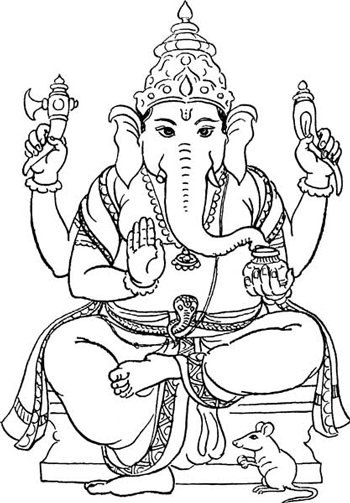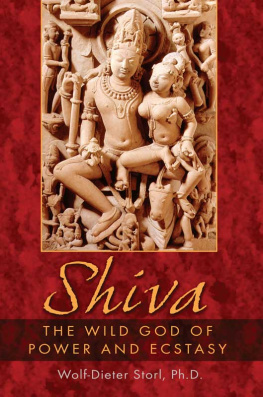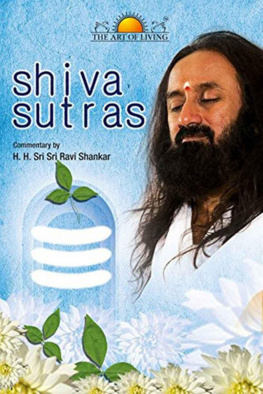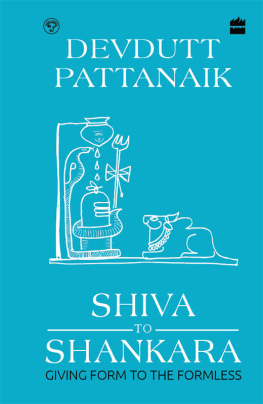
OM Shri Ganeshaya Namah

The sage should study the scriptures in his search
for knowledge; but then he should leave them, like the
chaff that is left behind, when the grains
of rice have been winnowed.
AMRTABINDU UPANISHAD

Shiva

THE WILD GOD OF
POWER AND ECSTASY

Wolf-Dieter Storl Ph.D.

Inner Traditions
Rochester, Vermont
INTRODUCTION

With the stick raised high, Illusion herds the worlds.
Lord white as jasmine [Shiva]
no one can overcome your illusion.
MAHADEVIYAKKA,
SOUTH INDIAN POETESS, TENTH CENTURY
Shiva! For his devotees, he is the entire universe and the core of all beings. Who but a fool, be he ever so wise, would dare take on the task of writing about him? Has the writer not heard the old Indian tale of the goddess of learning who, despite having mountains of ink powder, the sea as an inkwell, the World Tree as her writing pen, and the surface of the earth as her paper, failed to describe the splendor of Mahadev, the Great God? Still, neither the writer nor the reader need despair, for Shiva is the devotee of his devotees, the lover of his lovers, and though he is all-encompassing and all-transcendent, he reveals himself to his worshippersfor he is the very Self of each and every one.
In south India, when worshipping Shiva, one must first of all purify the body with water as one enters the temple, or holy site, where he customarily reveals his numinous presence. one brings him flowers, sweet smelling incense, and other beautiful things representing ones heart and soul, and dedicates them to Mahadev. One also offers a ripe coconut, which the attendant priest dashes against a hard stone surface, spilling the milk in front of the idol, or the lingam, which is Shivas sign. The hard-shelled nut represents none other than our skull, this citadel of our hardened out little ego. Willingly one sacrifices this accursed limited ego-nature to the all-encompassing greater Self. The ego dwarf, reducing the universe to his own diminished dimensions by means of his clever, cutting intellect, is never capable of grasping the wider mystery. Shiva, therefore, in an act of mercy, seizes it, smashes it to bits, drinks out its life fluid, and lets us find at-one-ment with him, our true Self. It is no wonder that the ego-centered individual has always shunned and feared this seeming destroyer. And no wonder, then, that Shiva is often seen as the diabolos, or devil.
The stories told in this book are common Indian lore. Grandmothers tell them to the children, peasant storytellers or wandering sadhus recite them in the evening to eager listeners. They are told, not just to entertain, but to teach, to make a point, or to illustrate some insight into the mysteries of life. My sources were mainly such oral tellings. There are however a number of good books, published in English that also address these tales and legends. Many are found in the various Puranas (tales of ancient times), such as the Shiva Purana. Helpful to the curious reader might be Cradle Tales of Hinduism by Sister Nivedita, Hindu Myths (Penguin Classics translated by Wendy OFlaherty), Classical Hindu Mythology (Cornelia Dimmit and J. A. B. van Buitenen, eds.), Hindu Mythology, Vedic and Puranic by W. J. Wilkins, and A Classical Dictionary of Hindu Mythology and Religion by John Dowson. All of these source books will be listed in the bibliography.

I went to India in the role of an ethnologist, as a visiting scholar at Benaras Hindu University, where I planned to record various aspects of cultural and social phenomena. Faced with the heat, health problems, and most of all, the magic of this fascinating land, my cool scholarly detachment could not prevail. It was as if I myself were seized by Hara, the seizer, and sacrificed to my higher Self. My paradigms of reality vaporized, my coconut was smashed, and the grace of a wider vision (darshana) was accorded. When I left Bharata (as the Indians call India), this holiest of lands, where the veil covering the supernatural worlds is gossamer thin and the gods still reveal themselves to humankind, I had no photographs, no tape recordings, and few notes. These things seemed too profane, too limited. I myself was the page upon which He had written His name. And now that sufficient time has passed since I came back into the world, I feel at last able to tell something about Mahadev who is, dear reader, also your innermost Self.
JOURNEY TO THE SOURCE OF TIME

You have no form,
even though with the help of Maya,
you take on myriads of forms.
You have no beginning,
though you are the beginning of all.
It is you who creates, upholds and dissolves the worlds.
MAHANIRVANA TANTRA
Without number, like the stars, and endlessly colorful are the gods and demons of India. Equally manifold are the stories, myths, and tales told about them. In our quest for Shiva, however, these others concern us but marginally. With Shiva we reach beyond polytheisms glitter and glow. With him, we enter realms deep in our innermost nature and simultaneously penetrate the profundities of ancient history. There, as the light of our spirit beams into the abysmal chasm, we vaguely discern the outlines of a most powerful archetype. Carl Gustav Jung would surely have agreed that we are confronted by one of the most original configurations of the Eurasian collective unconscious. But let us not go astray and judge that we are dealing merely with an entity of depth psychology. We are confronting a power that still rocks our lives, that sends its impulses from unfathomable depths beyond our rational consciousness, that forms our reality and sends its lifeblood pulsing through the outer world of nature as well as through the inner world of soul and spirit. The archetype works on the outside world and on the insideand beyond both.
The mystery we are approaching is the image of the human being itself. At the beginning of time, the image appeared as in a flash of lightning, by which a surprised primate saw himself for the first time and, in that instant, was torn from the dream consciousness of his animal state. This image of light, stunning that first human soul, has remained engraved in the human memory ever since. Undefinable and inapprehensible, the image was, nonetheless, given thousands of names, decorated with endless attributes, and honored in myriad rites and rituals. This first image became the king of all other archetypes, powers, and dominionsthe Lord of Gods. This image, this primal Archetype, is the key to the unspeakable mystery of humankind.
Next page
















